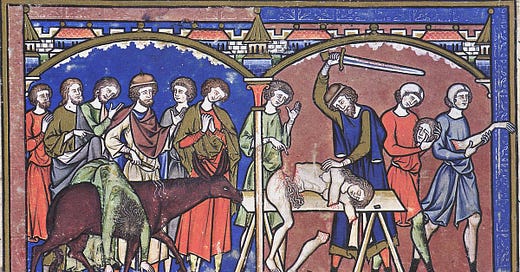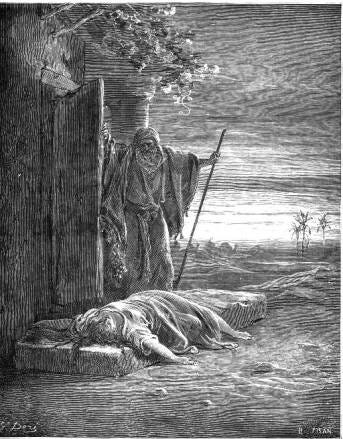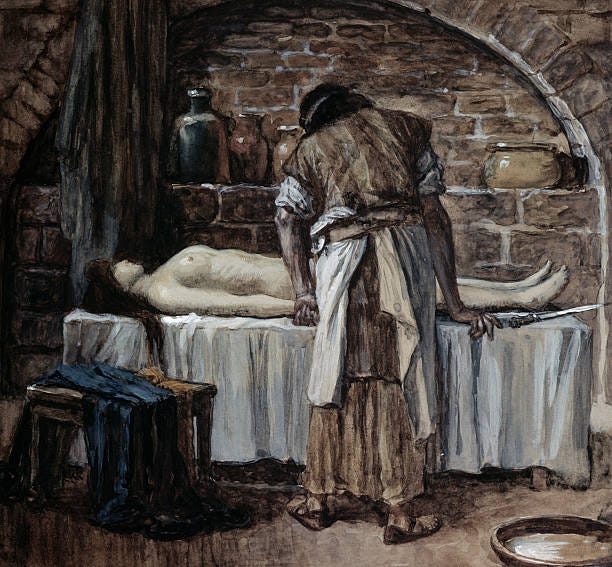“In those days there was no king in Israel; everyone did as he pleased.” (Judges 21:25)
This is a story about a Levite and his concubine. The Levite doesn’t have a name, and neither does the concubine. In fact, there are tons of people in this awful story and not a single one of them has a goddamn name.
Make of that what you will.
This Levite lives in the hills of Ephraim, but used to live in Judah, a day’s journey south. That was when he made eyes at a young woman from Bethlehem. He fell in love with her and proposed to make her his concubine.
A concubine, in case you don’t know, is a second-place spouse. It’s like marriage, but a little bit less so. Real wives first, concubines next—that’s the deal. But can there be real feelings between a man and his concubine?
There absolutely can be.
The Levite and his concubine live happily at first, but soon begin to argue. The young woman is scared and misses her home. One day she runs back to her father in Bethlehem.
She stays there for four months.
The Levite begins to miss her badly. He orders his attendant to prepare two donkeys for travel. The attendant packs food, water, perfumes, jewelry, gifts. Then the Levite, his attendant, and two donkeys set out on the road down to Bethlehem.
Dude’s gonna win back his girl.
The concubine’s father—he has no name—smiles when he sees his concu-son-in-law coming down the path. He cares for the attendant and the donkeys when they arrive, then rinses the dirt off the Levite’s feet. The father dines with him, offers him a bed, and wishes him goodnight.
In the morning, the Levite and his father-in-law speak as men. The Levite offers the father-in-law gifts for his daughter. They argued, but what couple doesn’t? He wants to be a good con-cuman for his daughter.
The father and the Levite embrace. The concubine comes out. They talk, and the father warmly suggests that the Levite stay another night. And he does.
Then the father urges them to stay for another, then another, and another.
On the fifth day, the Levite wakes up early to hitch his donkeys. But there is the father again, encouraging him to eat. They do this, and really it is quite delightful—the meal lasts the whole morning. That’s when the Levite announces that he really, really must be going. He says he has important business to attend to back in Ephraim, which is maybe not true, but at least it will get him away from these freaking Judeans.
He rides out on a donkey. The attendant leads the young woman on the other. It’s a little bit past noon when the girl waves goodbye to her father for the very last time.
It was perhaps a little rash to leave in the middle of the day. Especially in these lawless times, it is dangerous to travel. They need a place to lodge for the night.
The path takes them north into Benjamite territory, past a Canaanite city. The city was named Jerusalem. It was occupied by Jebusites and already famous as a great place to haggle over schwarma or commit a hate crime.
“I could really go for some schwarma,” said the attendant. “Maybe a hate crime or two.”
But the Levite would hear none of it. A Jebusite town? No, we can do better. Those people are not our people. Let’s go a bit longer, he told his attendant. There are a few Benjaminite cities up ahead, Ramah, or maybe even Gibeah.
They continued on the path. The sky began to darken.
At last, they reach Gibeah—where the people are nice and nothing bad could conceivably ever happen to anyone, especially not a beautiful young woman far away from her home.
• • •
If you’re looking for hospitality, you’re supposed to go to the town square, so that’s what they do. People pass them, scurrying to get home before dark. No one says a word, but the attendant catches a few men giving them the double-look—watching while pretending not to. He mentions this to no one.
They sit in the darkness, huddling with the donkeys.
A grey-haired man hobbles into the square. He holds a torch and walks with a limp that causes the flame to bob up and down, like a ship at harbor. He approaches the Levite.
“Travelers, eh—where are you headed to?” the Old Man says “And, while you’re at it, where are you from?”
“I’m from Ephraim. But we’re coming from Bethlehem.”
“Let me rephrase,” the Old Man says. “Don’t you know that if you sleep here, you will be robbed and or killed?”
The Levite explains that they left Bethlehem in a hurry and needed a place to stay.
“Enough with bad explanations,” the Old Man says, and he motions for them to come along.
When they arrive at his home, the Old Man feeds the donkeys. He assigns the concubine her own quarters in the back of the house. To the Levite, he offers food, drink, and friendly conversation.
Over wine, the Levite tells the Old Man about his travels, how he went to retrieve the young woman from her father, how his eagerness to return home was the cause of their problems. The Old Man says that he sees the predicament.
They continue to talk through the night. The Old Man, it turns out, is also from Ephraim. He lives with his daughter. There is no mention of a wife. But he admires that the Levite was willing to travel to Bethlehem to find his woman—these things matter.
They are then interrupted. Someone is pounding at the door.
The Old Man finds a drunk rabble outside his home. They are all local men. If the attendant had been there, he would have identified them as those he saw sneaking glances at them earlier.
“We hear that you’ve got a guest,” says the leader of the pack. “We’d like to get to know him better.”
You might be wondering how the rabble got here. After passing through the square, these guys had started drinking and telling tales. They told dirty jokes and famous tales. They drank to excess. Somebody got to telling the famous story of Lot and Sodom, about how the men of that city demanded that Lot offer up his guests for their carnal pleasure. It took a miracle to keep them from having their fun. And they laughed and laughed at this, and then they drank some more.
At some point, somebody joked that what they should really do is head over to the Old Man’s house. They should do the Lot thing to those travelers they’d seen before. As a joke. They all agreed that would be hilarious.
And a few drinks later, that joke had turned into a plan.
So here they are now, outside the house, laughing their asses off, telling the Old Man to hand over the Levite. They’d like to show him a good time.
Much as Lot does in the story, the Old Man panics. He cannot let these men have their way with the Levite…but how can he not? In his youth he might have put up a fight, but to do that now would mean certain injury or death. At the same time, how can he not stand in their way?
Just then, the Levite steps forward. He will not let them harm this kindly old man, the only kind person in this awful city. Not when there is another option.
The Levite hushes the rabble and whispers into the leader’s ear. “My concubine—you’ll find her in the back of the house.”
And that’s exactly where they find her.
In the morning, the Levite rises early. He is eager to get back on the road, to get to Ephraim, to do better this time with the woman he loves.
He tries to open the back door of the home. It won’t open—something is blocking it. He pushes harder, and finally the door gives.
To his horror, he sees the body of his beloved, collapsed on the threshold.
He wasn’t expecting this. He should have been, but he wasn’t.
She is dead.
The Levite lifts the concubine and places her on the second donkey. Without waiting for the attendant to wake, he mounts his donkey and leads them both out of Gibeah.
They make good time back to Ephraim.
All sorts of terrible things happen in the Book of Judges. Daughters are sacrificed. Brothers are slaughtered. Foxes are burned alive, and people are too. Not to mention poor Samson, who has his eyes gouged out and his heart broken again and again before being buried under a Philistine temple.
And yet, the absolute worst thing is about to happen right now, at the very end of this book.
We need to think about our Levite, his state of mind. He has no delusions about what he did—he gave her up to the drunken rabble. But what was his choice? It was her or the Old Man, feeble and kind. What sort of a society makes you choose who to offer to the rabble? And, oh Lord, they didn’t have to make her bleed, to kill her.
He is guilty, but he is not alone. Others must understand this.
The Levite unpacks his donkeys and delicately removes the body from her mount. The animal brays and wanders off.
He brings the concubine into his home and places her on a table.
He takes his sharpest knife in his hand.
With care, he carves the body up into pieces. Twelve pieces, in fact, one for each of the tribes of Israel, the nation that so rarely acts as one.
Hiding the parts in elaborate packaging, he calls for servants to deliver his parcels to the tribal leaders. This should be sent to Judah, he says, where the poor woman was born. This one for Menasheh, where the great Gideon was from. This for Dan, tribe of Samson, and this one to Reuben, and so on until the poor girl’s remains were dispatched across the country.
The leaders of Israel are not just disgusted when they receive these packages, they are mystified.
It only starts making sense when they gather together to discuss and realize—that in sum they had received the entirety of this poor girl’s body, and responsibility for her death.
In those days, there were no kings. There were judges who for a time would rise up and go to war with Midian, Ammon, Moab, Philistine. As a rule, these judges were bloodthirsty thugs and military-grade psychopaths. Their fury was glorious, but fundamentally they were charismatic warriors who did what they pleased. They were neither elected nor appointed. They did what they pleased.
This is what you get when people do what they please.
And so the tribal leaders together began to discuss what they could do about this terrible thing that had happened in their land, while the Levite stayed alone in his house and cried for days and days and days.
[MG here: Well, you can’t say Mike didn’t warn us this one was dark. If you’ve been enjoying these Bible stories as much as I have, tell Mike so in the comments. I want him to do a whole book.]









oop. The last sentence should've read: "The gravity of her request was NOT lost upon all Rabblers, and spirits rose many times that night.
Well another backstory is: the Concubine left the Master because he didn't treat her right and she hated it/him, so she took the chance to flee home when it was safe. Her family took her back in. The Master quarters his horses determined to have her back "in the saddle" and upon arrival is invited into her father''s house where they drink and wager for days to decide what she's worth and what "dowry" the Master shall pay to have her. The Rabblers know what's up -- the rich man's horses are outside her home along with a steady pile of emptied jugs -- mead, goat's milk, and other delectable deliveries, presumed. When confronted with the Rabblers her father let-in, she's willing and ready to have one last youthful glory of an orgy right then and there, yet only if they leave her dead by sunrise (or something like that. who knows? maybe she got creative knowing she was going to die, and danced seductively with anticipation that she would NEVER be with the Master, again). The gravity of her request was lost upon all Rabblers, and spirits rose many times that night.